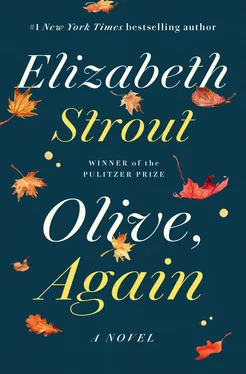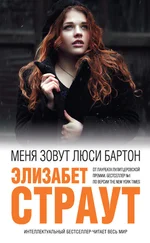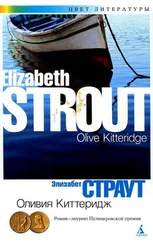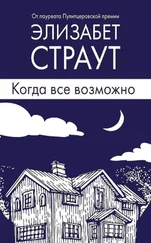Barbara Paznik did not even look at Olive when she got on; she simply went behind Olive and sat with someone else. No one sat in the seat next to Olive. And everyone seemed to be yakking to somebody. Then, as the van wound its way up the street and around the corner—Olive could not believe this—they all started to sing. “The wheels on the bus go round and round, round and round….” Women looked at her with laughter on their ancient faces as they sang, even the few old men were laughing. Olive had to look out of the window, her cheeks getting warm. “God, Jack,” she thought, “you’re missing a hell of a time.” She felt enormously angry at him for dying. And then she thought: He wasn’t so much, that Jack.

To Olive, it felt that a screen had been lowered over her, the type of thing that went over a cake on a summer picnic table to keep the flies out. In other words, she was trapped, and her vision of the world had become smaller. Every morning, she drove to the local doughnut shop and bought two doughnuts and a cup of coffee to go, and then she drove out to Juniper Point and watched the water while she ate her doughnuts; the tides, the seaweed, the spruce trees on the little island, these things reminded her of her life with Henry. She would get out and throw her coffee cup in the garbage can there. And then reluctantly she drove back to the Maple Tree Apartments.
Her apartment, which was one room with a kitchenette and a bedroom and a large bathroom, faced north, and therefore got no direct sunlight. This bothered Olive tremendously. She loved the sun. Was she to live without sun? She had told this to Christopher on the telephone when she had first arrived, and he said, “Mom, we were lucky to get you in there at all.”
She had brought with her the single bed from the guest room of the house she had lived in with her second husband, Jack, and a wooden table that she had had with her first husband, Henry. And a small hutch that she had with Henry as well. It had been Jack who had suggested storing those pieces of furniture in the basement of their house, and now she was very glad she had done so. It meant there were pieces of Henry here. “Thank you, Jack,” she had said, after the movers had left. And then she said, “And thank you, Henry.” On the hutch she had placed a photograph of Henry and also a smaller photograph of Jack.
—
Every evening a group of residents gathered in the lounge area, where there were small wooden tables and a group of chairs, dark green with armrests. Here these people had their wine, and Olive kept trying to join them. The evening after that horrific van ride, she went and stood near the group of people in the lounge, holding a glass of white wine, but these people—she thought—made it clear that she was not one of them. They were wealthy, Olive had come to understand, and they were snobs. This evening a woman, who was tall and wore dark blue slacks with a white blouse, was talking about Harvard. Harvard this, and Harvard that. Olive said to her, “My second husband taught at Harvard. He went to Yale, and then he was the youngest person to get tenure at Harvard.”
The woman looked at her. Just looked at her. “I see,” she said, and walked away.
“Well, hell’s bells to all of you,” Olive said, putting her wineglass down on a small tabletop, and in her mind she meant Jack as well. In fact, when she got back to her apartment, she put away the one photograph of Jack, and just had Henry’s photo there on the hutch by itself.
—
A few of the people were local; her friend Edith, for example, who had lived in this place for years, but Edith had a full life here. When Olive, on her very first night, went into the dining room for supper—it was a large room with foolish white latticework on the top half of the walls—Edith was sitting at a table for four, with three other people, and she gave Olive a little wave, and that was that, and Olive sat alone at a table for two. She hadn’t known what to do with her face as she ate the stupid salad from the salad bar, and then the skimpy piece of salmon and yellow rice.
But Bernie Green was living here. Olive remembered him, because when Henry had to sell his pharmacy to that huge chain, Bernie had handled the legal aspects for him, and Henry had always spoken highly of him. And here he was, looking old as the hills, and where was his wife? His wife was over the bridge, it turned out; she had developed Alzheimer’s very soon after they had moved here together, and so Bernie went every morning—over the little walking bridge that went to the Alzheimer’s unit—and he sat by her bed even as she became more and more out of it. Whenever Olive saw him he had tears in his eyes, and sometimes they were just coming straight down his face. What was that all about? She asked Christopher this on the phone, and he said, “Well, Mom, he’s probably sad about his wife,” and Olive had said, “But, Chris, he walks around weeping!” And Christopher had said it was cultural. “Cultural?” Olive demanded. “What in hell does that mean?” Christopher said it meant the guy was Jewish, and Jewish men weren’t ashamed to cry.
Olive hung up disgusted with them both.
Ethel MacPherson had lived here for six months—she had moved in after her husband, Fergus, died—and she seemed to know everything about everyone; she was the one who told Olive about Bernie’s wife going over the bridge. Ethel said, “Oh, I couldn’t stand being in that big old house after Fergie died! Oh, how I miss him!”
“Wasn’t he the fellow that used to walk around Crosby in his kilt?” Olive asked.
Ethel said, Yes—that was her husband.
“What was that all about?” Olive asked. “I never quite understood that myself.”
Ethel seemed insulted by that. “Well, if you had Scottish ancestry you might think differently” is what Ethel said.
And Olive said, “I do have Scottish ancestry!”
“Well, maybe it doesn’t mean to you what it did to Fergie,” Ethel said, and she moved away, waving at someone across the dining room.
Phooey to you, Olive thought. But she felt awful; nobody was talking to her, and after a few minutes she went back to her little apartment.
As soon as it got dark she tucked herself into her little single bed and watched television. The news was amazing to her. And this helped her. The country was in terrible disarray, and Olive found this interesting. At times she thought fascism might be knocking on the door of the country, but then she would think, Oh, I’ll die soon, who cares. Sometimes she thought of Christopher and all his kids and she felt worried about their future, but then she would think: There’s nothing I can do about it, everything is going to hell.
Eventually Olive found the Chipmans; they had lived an hour away in Saco, and he was a retired engineer and his wife was a retired nurse. Both were Democrats, thank God, so they could talk about the mess of the world, and they ate their supper together, the three of them at a table for four. This helped Olive; it gave her a place. The fact that she thought they were both a bit dull was not something she dwelled on, but often enough after eating with them she would roll her eyes on the way back to her room.
This is how she lived.
A few days after Christmas, her son, Christopher, and his wife and all four of their children came to visit. And here was a surprise! Christopher’s oldest son, Theodore, who had been fathered by a different man and who had never, in Olive’s memory, spoken to her, stepped into her apartment, a young adolescent now, and said, “I’m sorry you got sick. With your heart and stuff.”
Читать дальше













